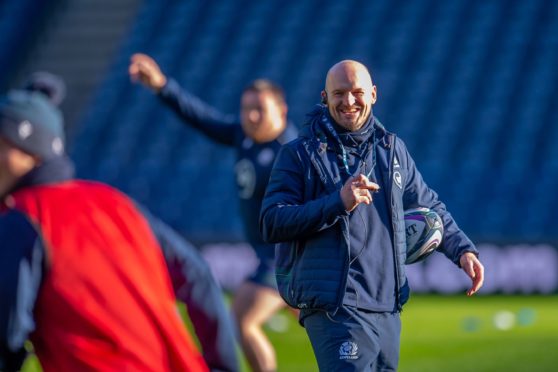Rugby moves at relentless speed in the modern era.
In a week when we’ve been constantly reminded of the (few) glories of past Calcutta Cups, each with little or no bearing whatsoever on the modern, gruellingly impactful sport, we reach a pivotal point in Scotland and head coach Gregor Townsend’s immediate future.
Yes, we’re only a mere months on from the last pivotal point in Scotland’s continuing development, and that was a huge backward step. The disaster in Yokohama in the opening game of the Rugby World Cup was not wholly righted last week in Dublin but it was a foundation on which to build.
Now, quite simply, win the famous old cup made of melted-down rupees for the third time at Murrayfield this afternoon and Townsend will regain control, not quite as commandingly as he did during Scotland’s excellent season of 2017-18, but strongly enough that he will see out 2020 in charge of the team, and perhaps even lead them to a third three-win Six Nations in the last four years.
That’s not really a special kind of standard, but it’s as good as Scotland have done since the championship went to six teams.
Lose, and Scotland will head to Rome in defensive mode looking to avoid a possible whitewash that would be simply catastrophic, a headlong plummet back to the days of the first 15 years of this century when the Italian match was the difference between simple humiliation and survival.
And a whitewash would almost certainly mean Townsend could not continue as Scotland head coach. This game, on top of all the other stuff involving “war” and “hatreds” and what it means to the fans, is a tipping point for his time in charge of the national team, and it could go either way.
As added spice, both teams come into the big game needing a win to get their 2020 championship underway, and the weather conditions are going to be challenging – perhaps as bad as they’ve ever been in this fixture since 2000, when a divine storm swept in and Duncan Hodge was hero for the day as Scotland unseated a Grand Slam-bound England to avoid a whitewash themselves.
Scotland have featured much more on England’s success at the Rugby World Cup than last week’s poor display in Paris against a young and inexperienced France. You don’t get to the World Cup Final without being a good team, the Scots have faithfully and respectfully repeated throughout this week.
Well, England’s performance in the semi-final against New Zealand was one for the ages, completely shutting down the world’s most effective attacking rugby team. But they flopped miserably in the final, hammered an Australian team that were there for the hammering, and tactfully avoided a tricky game against France because of Typhoon Hagibis.
They’ve been inconsistent for three years, and Eddie Jones doesn’t seem to know what his best team is, or formations are, anymore. Two years ago he brought a team without open-sides to Murrayfield to play the brutality game and England were run off their feet, this time he has three across the back row.
But England are spoiling for a close-quarters wrestle in the rain, Scotland think, after going with six forwards and two backs on their bench of “finishers”.
“From Eddie’s comments I would suggest that is about the style of rugby they want to play, playing to their strengths, which are playing that front foot game of rugby whether it is set piece, carrying directly and being physical around the fringes in defence,” said assistant coach Danny Wilson yesterday.
“There’s also potentially an awareness of forecast conditions. A combination of the tactics they want to employ, plus dealing with the conditions has left them to decide on six-two.”
Scotland have to be able to deal with that, and also the team that kicks most in World Rugby. But they also have to address their issues in Dublin: discipline, the breakdown and scoring when in favourable territory.
The 15 penalties in Dublin were an outlier, the Scots believe, from their average of below ten a game. The breakdown is about decision making and support to the ball carrier, which they have focused on this week.
Scoring tries from favourable positions has been an issue for Townsend’s Scotland teams, whether as head or assistant coach, with the exception of those salad days of 2017-18.
The onus is squarely on Adam Hastings to make that point of difference, the way we expect Finn Russell to do, and which he has consistently done against today’s opponents in the last two years.
And maybe that ties in with the pivotal nature of the game for the head coach. If Hastings goes well and Scotland win, Townsend also has an unassailable position in the dispute with his erstwhile star stand-off back in Paris.
Lose, and the clamour to get Finn back will be deafening.

